Detailed Analysis: Corporations Act 2001 and Company Law Principles
VerifiedAdded on 2023/06/05
|10
|3265
|417
Homework Assignment
AI Summary
This assignment provides a detailed analysis of the Corporations Act 2001, focusing on shareholder rights, share expropriation, and contractual remedies within the context of two case studies. The first case involves a company, Oh My Pty Ltd, where issues of share expropriation, pre-incorporation contracts, and breach of contract are examined, specifically concerning the rights of minority shareholders and the remedies available to parties in the event of contractual breaches. The analysis references relevant sections of the Corporations Act, such as section 136 and section 232, and the landmark case of Gambotto v WCP Limited to illustrate legal principles. The second case, Drink It Up Pty Ltd, explores the responsibilities of directors and the management of company businesses under section 198A(1) of the Corporations Act. The assignment highlights the legal obligations of directors and their impact on company operations and shareholder interests. The analysis examines the legal framework for company operations, including the roles and responsibilities of various stakeholders, providing a comprehensive understanding of corporate law principles in Australia.
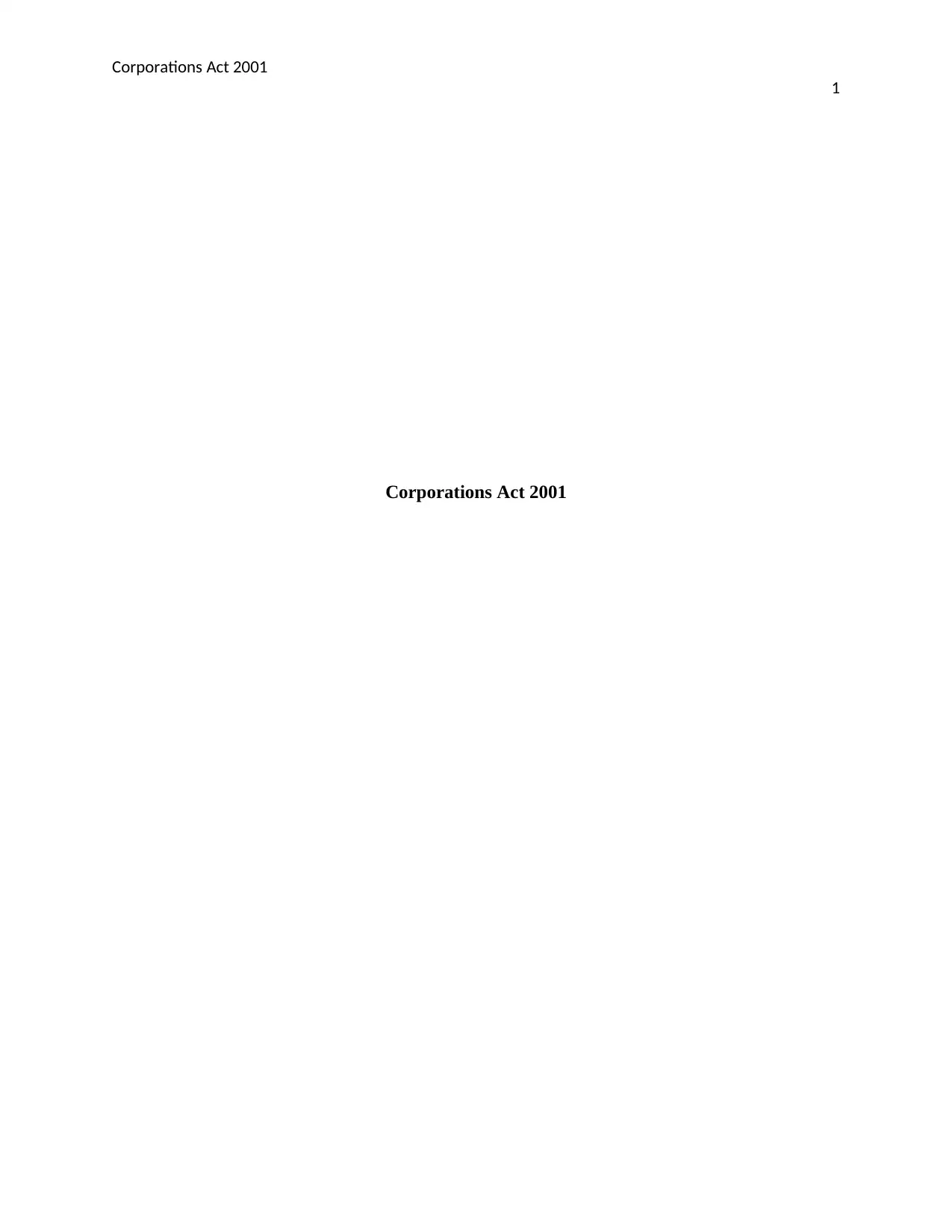
Corporations Act 2001
1
Corporations Act 2001
1
Corporations Act 2001
Paraphrase This Document
Need a fresh take? Get an instant paraphrase of this document with our AI Paraphraser
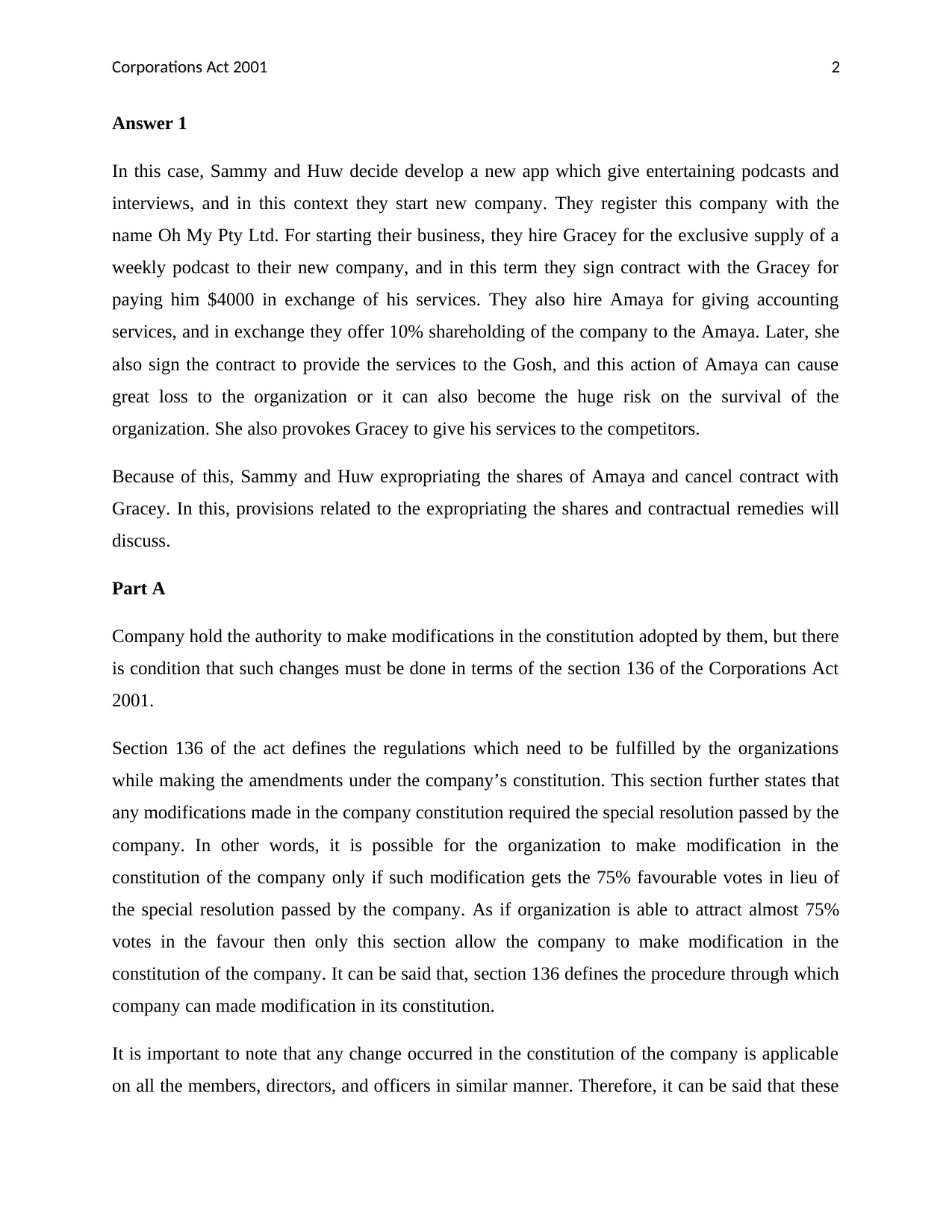
Corporations Act 2001 2
Answer 1
In this case, Sammy and Huw decide develop a new app which give entertaining podcasts and
interviews, and in this context they start new company. They register this company with the
name Oh My Pty Ltd. For starting their business, they hire Gracey for the exclusive supply of a
weekly podcast to their new company, and in this term they sign contract with the Gracey for
paying him $4000 in exchange of his services. They also hire Amaya for giving accounting
services, and in exchange they offer 10% shareholding of the company to the Amaya. Later, she
also sign the contract to provide the services to the Gosh, and this action of Amaya can cause
great loss to the organization or it can also become the huge risk on the survival of the
organization. She also provokes Gracey to give his services to the competitors.
Because of this, Sammy and Huw expropriating the shares of Amaya and cancel contract with
Gracey. In this, provisions related to the expropriating the shares and contractual remedies will
discuss.
Part A
Company hold the authority to make modifications in the constitution adopted by them, but there
is condition that such changes must be done in terms of the section 136 of the Corporations Act
2001.
Section 136 of the act defines the regulations which need to be fulfilled by the organizations
while making the amendments under the company’s constitution. This section further states that
any modifications made in the company constitution required the special resolution passed by the
company. In other words, it is possible for the organization to make modification in the
constitution of the company only if such modification gets the 75% favourable votes in lieu of
the special resolution passed by the company. As if organization is able to attract almost 75%
votes in the favour then only this section allow the company to make modification in the
constitution of the company. It can be said that, section 136 defines the procedure through which
company can made modification in its constitution.
It is important to note that any change occurred in the constitution of the company is applicable
on all the members, directors, and officers in similar manner. Therefore, it can be said that these
Answer 1
In this case, Sammy and Huw decide develop a new app which give entertaining podcasts and
interviews, and in this context they start new company. They register this company with the
name Oh My Pty Ltd. For starting their business, they hire Gracey for the exclusive supply of a
weekly podcast to their new company, and in this term they sign contract with the Gracey for
paying him $4000 in exchange of his services. They also hire Amaya for giving accounting
services, and in exchange they offer 10% shareholding of the company to the Amaya. Later, she
also sign the contract to provide the services to the Gosh, and this action of Amaya can cause
great loss to the organization or it can also become the huge risk on the survival of the
organization. She also provokes Gracey to give his services to the competitors.
Because of this, Sammy and Huw expropriating the shares of Amaya and cancel contract with
Gracey. In this, provisions related to the expropriating the shares and contractual remedies will
discuss.
Part A
Company hold the authority to make modifications in the constitution adopted by them, but there
is condition that such changes must be done in terms of the section 136 of the Corporations Act
2001.
Section 136 of the act defines the regulations which need to be fulfilled by the organizations
while making the amendments under the company’s constitution. This section further states that
any modifications made in the company constitution required the special resolution passed by the
company. In other words, it is possible for the organization to make modification in the
constitution of the company only if such modification gets the 75% favourable votes in lieu of
the special resolution passed by the company. As if organization is able to attract almost 75%
votes in the favour then only this section allow the company to make modification in the
constitution of the company. It can be said that, section 136 defines the procedure through which
company can made modification in its constitution.
It is important to note that any change occurred in the constitution of the company is applicable
on all the members, directors, and officers in similar manner. Therefore, it can be said that these
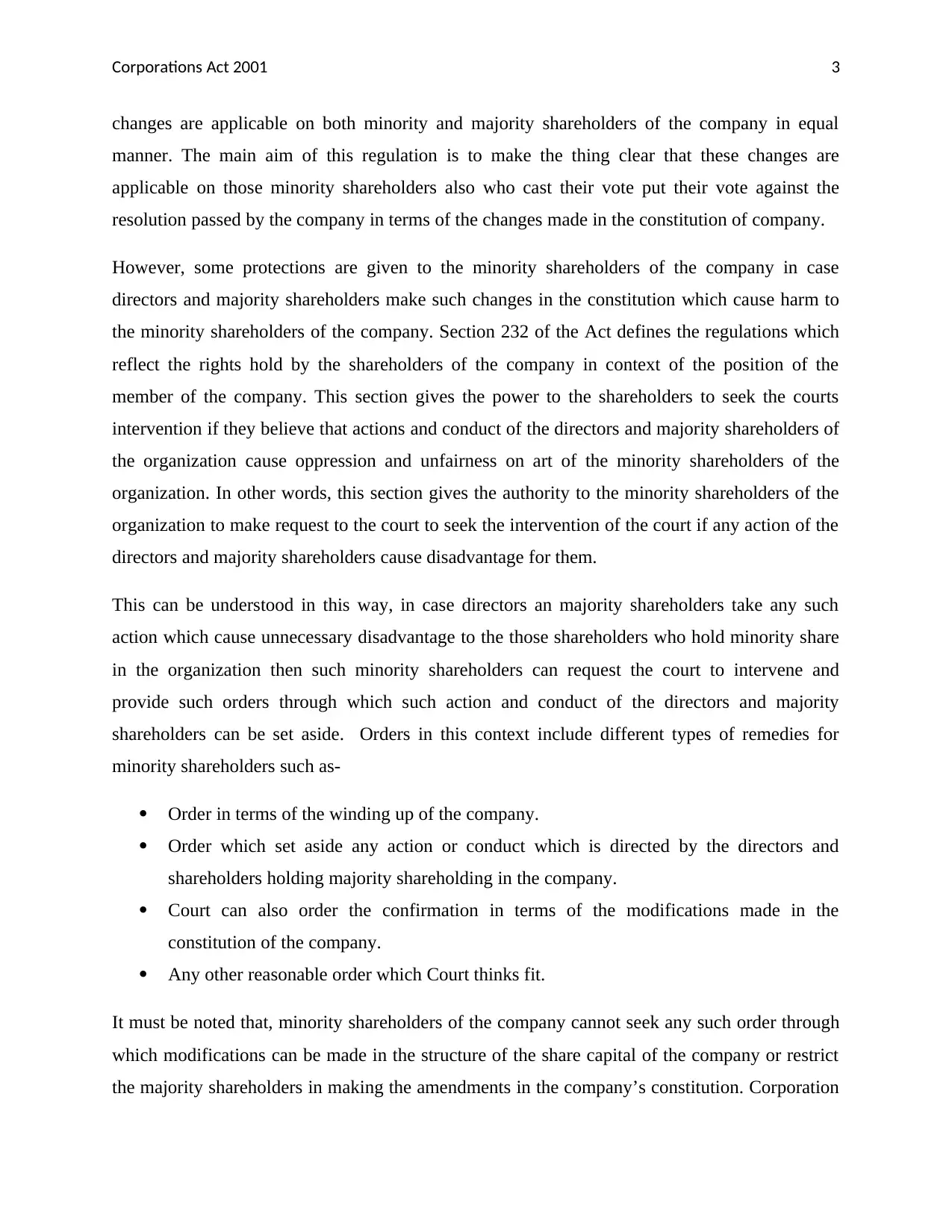
Corporations Act 2001 3
changes are applicable on both minority and majority shareholders of the company in equal
manner. The main aim of this regulation is to make the thing clear that these changes are
applicable on those minority shareholders also who cast their vote put their vote against the
resolution passed by the company in terms of the changes made in the constitution of company.
However, some protections are given to the minority shareholders of the company in case
directors and majority shareholders make such changes in the constitution which cause harm to
the minority shareholders of the company. Section 232 of the Act defines the regulations which
reflect the rights hold by the shareholders of the company in context of the position of the
member of the company. This section gives the power to the shareholders to seek the courts
intervention if they believe that actions and conduct of the directors and majority shareholders of
the organization cause oppression and unfairness on art of the minority shareholders of the
organization. In other words, this section gives the authority to the minority shareholders of the
organization to make request to the court to seek the intervention of the court if any action of the
directors and majority shareholders cause disadvantage for them.
This can be understood in this way, in case directors an majority shareholders take any such
action which cause unnecessary disadvantage to the those shareholders who hold minority share
in the organization then such minority shareholders can request the court to intervene and
provide such orders through which such action and conduct of the directors and majority
shareholders can be set aside. Orders in this context include different types of remedies for
minority shareholders such as-
Order in terms of the winding up of the company.
Order which set aside any action or conduct which is directed by the directors and
shareholders holding majority shareholding in the company.
Court can also order the confirmation in terms of the modifications made in the
constitution of the company.
Any other reasonable order which Court thinks fit.
It must be noted that, minority shareholders of the company cannot seek any such order through
which modifications can be made in the structure of the share capital of the company or restrict
the majority shareholders in making the amendments in the company’s constitution. Corporation
changes are applicable on both minority and majority shareholders of the company in equal
manner. The main aim of this regulation is to make the thing clear that these changes are
applicable on those minority shareholders also who cast their vote put their vote against the
resolution passed by the company in terms of the changes made in the constitution of company.
However, some protections are given to the minority shareholders of the company in case
directors and majority shareholders make such changes in the constitution which cause harm to
the minority shareholders of the company. Section 232 of the Act defines the regulations which
reflect the rights hold by the shareholders of the company in context of the position of the
member of the company. This section gives the power to the shareholders to seek the courts
intervention if they believe that actions and conduct of the directors and majority shareholders of
the organization cause oppression and unfairness on art of the minority shareholders of the
organization. In other words, this section gives the authority to the minority shareholders of the
organization to make request to the court to seek the intervention of the court if any action of the
directors and majority shareholders cause disadvantage for them.
This can be understood in this way, in case directors an majority shareholders take any such
action which cause unnecessary disadvantage to the those shareholders who hold minority share
in the organization then such minority shareholders can request the court to intervene and
provide such orders through which such action and conduct of the directors and majority
shareholders can be set aside. Orders in this context include different types of remedies for
minority shareholders such as-
Order in terms of the winding up of the company.
Order which set aside any action or conduct which is directed by the directors and
shareholders holding majority shareholding in the company.
Court can also order the confirmation in terms of the modifications made in the
constitution of the company.
Any other reasonable order which Court thinks fit.
It must be noted that, minority shareholders of the company cannot seek any such order through
which modifications can be made in the structure of the share capital of the company or restrict
the majority shareholders in making the amendments in the company’s constitution. Corporation
⊘ This is a preview!⊘
Do you want full access?
Subscribe today to unlock all pages.

Trusted by 1+ million students worldwide
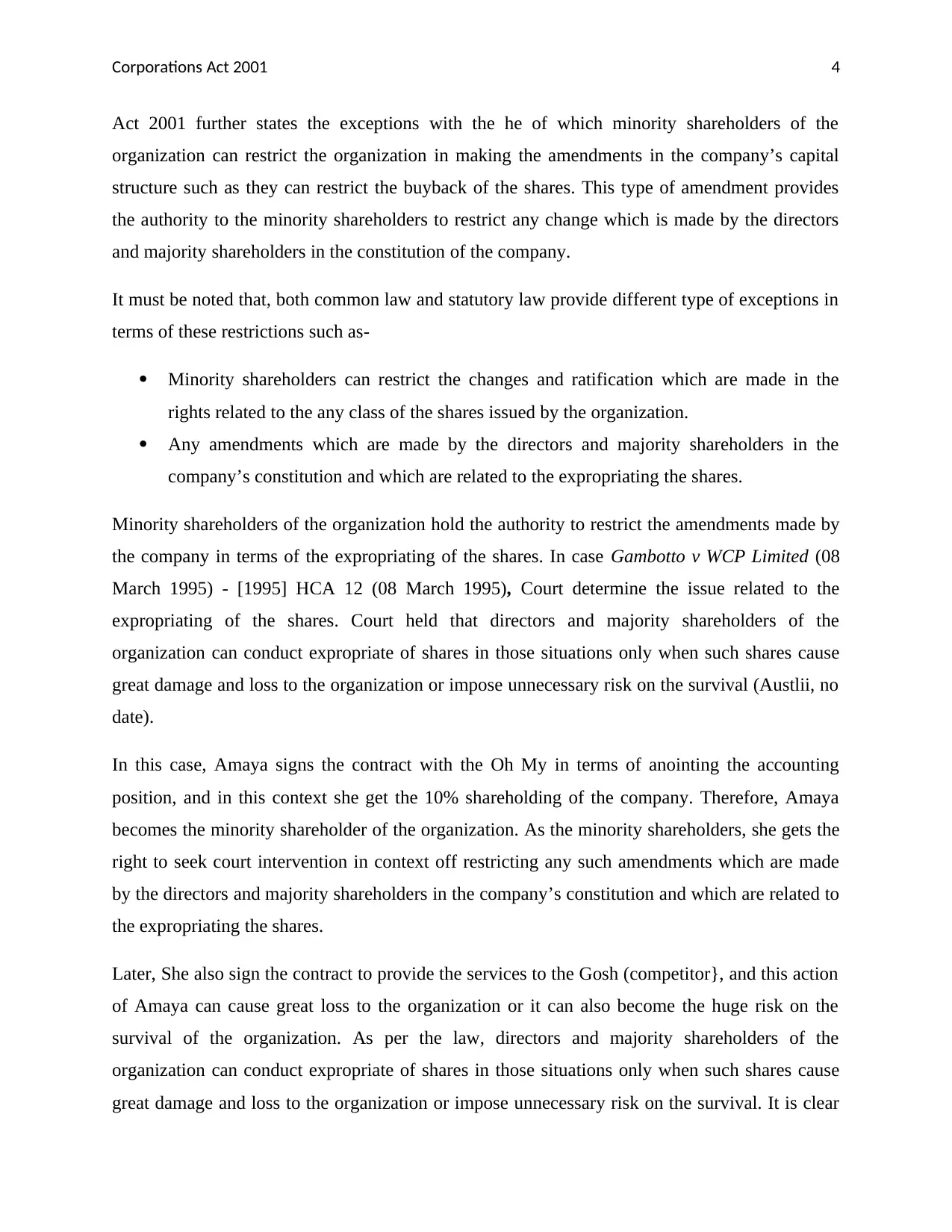
Corporations Act 2001 4
Act 2001 further states the exceptions with the he of which minority shareholders of the
organization can restrict the organization in making the amendments in the company’s capital
structure such as they can restrict the buyback of the shares. This type of amendment provides
the authority to the minority shareholders to restrict any change which is made by the directors
and majority shareholders in the constitution of the company.
It must be noted that, both common law and statutory law provide different type of exceptions in
terms of these restrictions such as-
Minority shareholders can restrict the changes and ratification which are made in the
rights related to the any class of the shares issued by the organization.
Any amendments which are made by the directors and majority shareholders in the
company’s constitution and which are related to the expropriating the shares.
Minority shareholders of the organization hold the authority to restrict the amendments made by
the company in terms of the expropriating of the shares. In case Gambotto v WCP Limited (08
March 1995) - [1995] HCA 12 (08 March 1995), Court determine the issue related to the
expropriating of the shares. Court held that directors and majority shareholders of the
organization can conduct expropriate of shares in those situations only when such shares cause
great damage and loss to the organization or impose unnecessary risk on the survival (Austlii, no
date).
In this case, Amaya signs the contract with the Oh My in terms of anointing the accounting
position, and in this context she get the 10% shareholding of the company. Therefore, Amaya
becomes the minority shareholder of the organization. As the minority shareholders, she gets the
right to seek court intervention in context off restricting any such amendments which are made
by the directors and majority shareholders in the company’s constitution and which are related to
the expropriating the shares.
Later, She also sign the contract to provide the services to the Gosh (competitor}, and this action
of Amaya can cause great loss to the organization or it can also become the huge risk on the
survival of the organization. As per the law, directors and majority shareholders of the
organization can conduct expropriate of shares in those situations only when such shares cause
great damage and loss to the organization or impose unnecessary risk on the survival. It is clear
Act 2001 further states the exceptions with the he of which minority shareholders of the
organization can restrict the organization in making the amendments in the company’s capital
structure such as they can restrict the buyback of the shares. This type of amendment provides
the authority to the minority shareholders to restrict any change which is made by the directors
and majority shareholders in the constitution of the company.
It must be noted that, both common law and statutory law provide different type of exceptions in
terms of these restrictions such as-
Minority shareholders can restrict the changes and ratification which are made in the
rights related to the any class of the shares issued by the organization.
Any amendments which are made by the directors and majority shareholders in the
company’s constitution and which are related to the expropriating the shares.
Minority shareholders of the organization hold the authority to restrict the amendments made by
the company in terms of the expropriating of the shares. In case Gambotto v WCP Limited (08
March 1995) - [1995] HCA 12 (08 March 1995), Court determine the issue related to the
expropriating of the shares. Court held that directors and majority shareholders of the
organization can conduct expropriate of shares in those situations only when such shares cause
great damage and loss to the organization or impose unnecessary risk on the survival (Austlii, no
date).
In this case, Amaya signs the contract with the Oh My in terms of anointing the accounting
position, and in this context she get the 10% shareholding of the company. Therefore, Amaya
becomes the minority shareholder of the organization. As the minority shareholders, she gets the
right to seek court intervention in context off restricting any such amendments which are made
by the directors and majority shareholders in the company’s constitution and which are related to
the expropriating the shares.
Later, She also sign the contract to provide the services to the Gosh (competitor}, and this action
of Amaya can cause great loss to the organization or it can also become the huge risk on the
survival of the organization. As per the law, directors and majority shareholders of the
organization can conduct expropriate of shares in those situations only when such shares cause
great damage and loss to the organization or impose unnecessary risk on the survival. It is clear
Paraphrase This Document
Need a fresh take? Get an instant paraphrase of this document with our AI Paraphraser
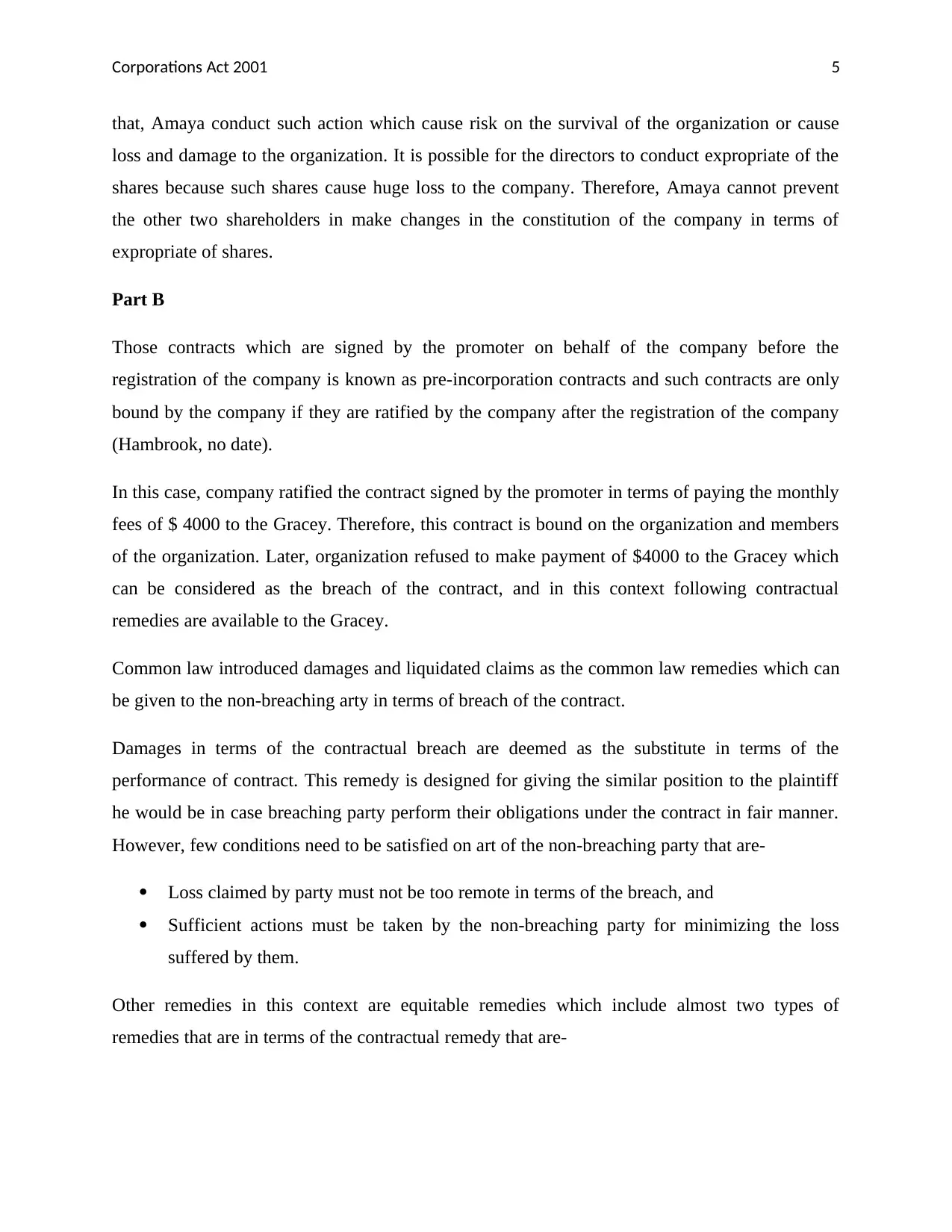
Corporations Act 2001 5
that, Amaya conduct such action which cause risk on the survival of the organization or cause
loss and damage to the organization. It is possible for the directors to conduct expropriate of the
shares because such shares cause huge loss to the company. Therefore, Amaya cannot prevent
the other two shareholders in make changes in the constitution of the company in terms of
expropriate of shares.
Part B
Those contracts which are signed by the promoter on behalf of the company before the
registration of the company is known as pre-incorporation contracts and such contracts are only
bound by the company if they are ratified by the company after the registration of the company
(Hambrook, no date).
In this case, company ratified the contract signed by the promoter in terms of paying the monthly
fees of $ 4000 to the Gracey. Therefore, this contract is bound on the organization and members
of the organization. Later, organization refused to make payment of $4000 to the Gracey which
can be considered as the breach of the contract, and in this context following contractual
remedies are available to the Gracey.
Common law introduced damages and liquidated claims as the common law remedies which can
be given to the non-breaching arty in terms of breach of the contract.
Damages in terms of the contractual breach are deemed as the substitute in terms of the
performance of contract. This remedy is designed for giving the similar position to the plaintiff
he would be in case breaching party perform their obligations under the contract in fair manner.
However, few conditions need to be satisfied on art of the non-breaching party that are-
Loss claimed by party must not be too remote in terms of the breach, and
Sufficient actions must be taken by the non-breaching party for minimizing the loss
suffered by them.
Other remedies in this context are equitable remedies which include almost two types of
remedies that are in terms of the contractual remedy that are-
that, Amaya conduct such action which cause risk on the survival of the organization or cause
loss and damage to the organization. It is possible for the directors to conduct expropriate of the
shares because such shares cause huge loss to the company. Therefore, Amaya cannot prevent
the other two shareholders in make changes in the constitution of the company in terms of
expropriate of shares.
Part B
Those contracts which are signed by the promoter on behalf of the company before the
registration of the company is known as pre-incorporation contracts and such contracts are only
bound by the company if they are ratified by the company after the registration of the company
(Hambrook, no date).
In this case, company ratified the contract signed by the promoter in terms of paying the monthly
fees of $ 4000 to the Gracey. Therefore, this contract is bound on the organization and members
of the organization. Later, organization refused to make payment of $4000 to the Gracey which
can be considered as the breach of the contract, and in this context following contractual
remedies are available to the Gracey.
Common law introduced damages and liquidated claims as the common law remedies which can
be given to the non-breaching arty in terms of breach of the contract.
Damages in terms of the contractual breach are deemed as the substitute in terms of the
performance of contract. This remedy is designed for giving the similar position to the plaintiff
he would be in case breaching party perform their obligations under the contract in fair manner.
However, few conditions need to be satisfied on art of the non-breaching party that are-
Loss claimed by party must not be too remote in terms of the breach, and
Sufficient actions must be taken by the non-breaching party for minimizing the loss
suffered by them.
Other remedies in this context are equitable remedies which include almost two types of
remedies that are in terms of the contractual remedy that are-
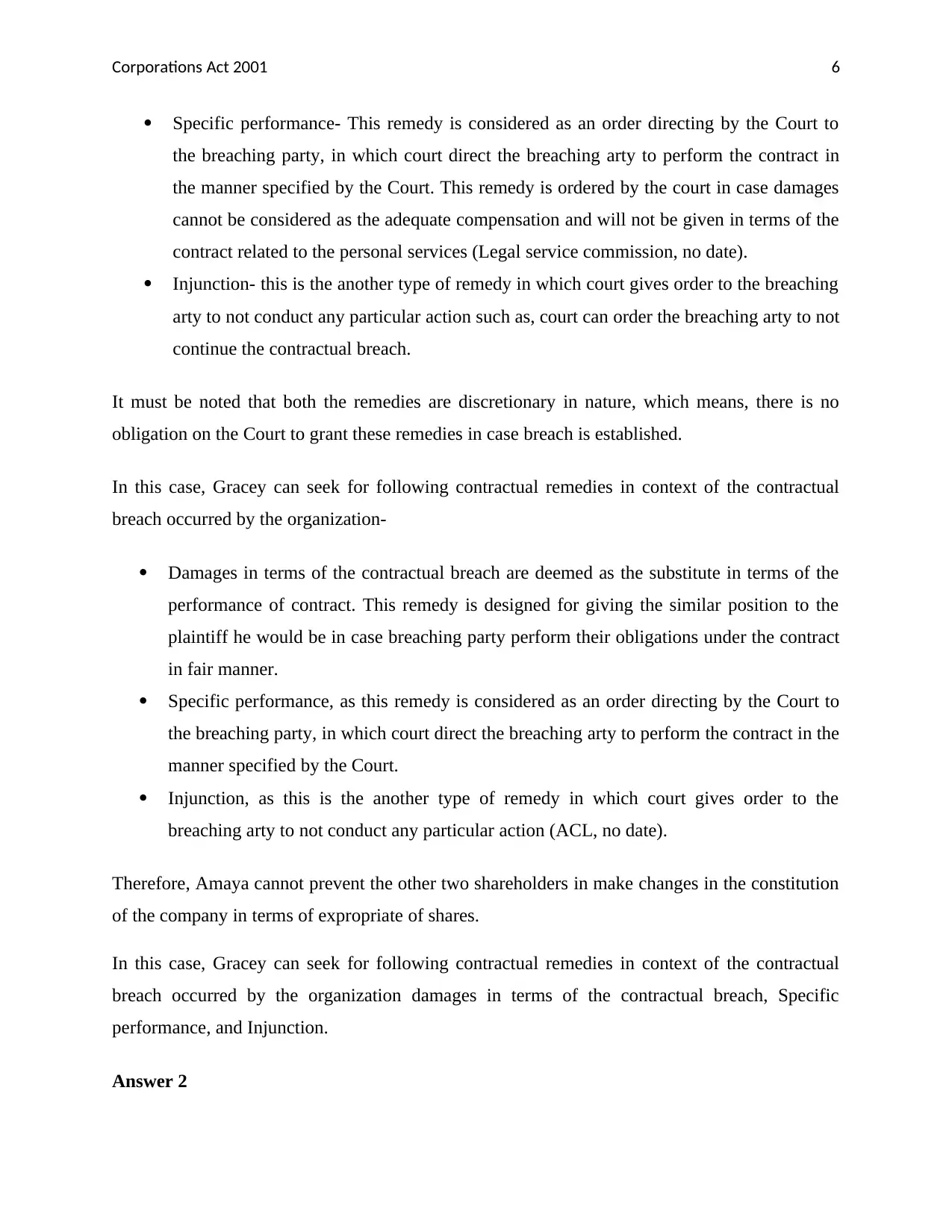
Corporations Act 2001 6
Specific performance- This remedy is considered as an order directing by the Court to
the breaching party, in which court direct the breaching arty to perform the contract in
the manner specified by the Court. This remedy is ordered by the court in case damages
cannot be considered as the adequate compensation and will not be given in terms of the
contract related to the personal services (Legal service commission, no date).
Injunction- this is the another type of remedy in which court gives order to the breaching
arty to not conduct any particular action such as, court can order the breaching arty to not
continue the contractual breach.
It must be noted that both the remedies are discretionary in nature, which means, there is no
obligation on the Court to grant these remedies in case breach is established.
In this case, Gracey can seek for following contractual remedies in context of the contractual
breach occurred by the organization-
Damages in terms of the contractual breach are deemed as the substitute in terms of the
performance of contract. This remedy is designed for giving the similar position to the
plaintiff he would be in case breaching party perform their obligations under the contract
in fair manner.
Specific performance, as this remedy is considered as an order directing by the Court to
the breaching party, in which court direct the breaching arty to perform the contract in the
manner specified by the Court.
Injunction, as this is the another type of remedy in which court gives order to the
breaching arty to not conduct any particular action (ACL, no date).
Therefore, Amaya cannot prevent the other two shareholders in make changes in the constitution
of the company in terms of expropriate of shares.
In this case, Gracey can seek for following contractual remedies in context of the contractual
breach occurred by the organization damages in terms of the contractual breach, Specific
performance, and Injunction.
Answer 2
Specific performance- This remedy is considered as an order directing by the Court to
the breaching party, in which court direct the breaching arty to perform the contract in
the manner specified by the Court. This remedy is ordered by the court in case damages
cannot be considered as the adequate compensation and will not be given in terms of the
contract related to the personal services (Legal service commission, no date).
Injunction- this is the another type of remedy in which court gives order to the breaching
arty to not conduct any particular action such as, court can order the breaching arty to not
continue the contractual breach.
It must be noted that both the remedies are discretionary in nature, which means, there is no
obligation on the Court to grant these remedies in case breach is established.
In this case, Gracey can seek for following contractual remedies in context of the contractual
breach occurred by the organization-
Damages in terms of the contractual breach are deemed as the substitute in terms of the
performance of contract. This remedy is designed for giving the similar position to the
plaintiff he would be in case breaching party perform their obligations under the contract
in fair manner.
Specific performance, as this remedy is considered as an order directing by the Court to
the breaching party, in which court direct the breaching arty to perform the contract in the
manner specified by the Court.
Injunction, as this is the another type of remedy in which court gives order to the
breaching arty to not conduct any particular action (ACL, no date).
Therefore, Amaya cannot prevent the other two shareholders in make changes in the constitution
of the company in terms of expropriate of shares.
In this case, Gracey can seek for following contractual remedies in context of the contractual
breach occurred by the organization damages in terms of the contractual breach, Specific
performance, and Injunction.
Answer 2
⊘ This is a preview!⊘
Do you want full access?
Subscribe today to unlock all pages.

Trusted by 1+ million students worldwide
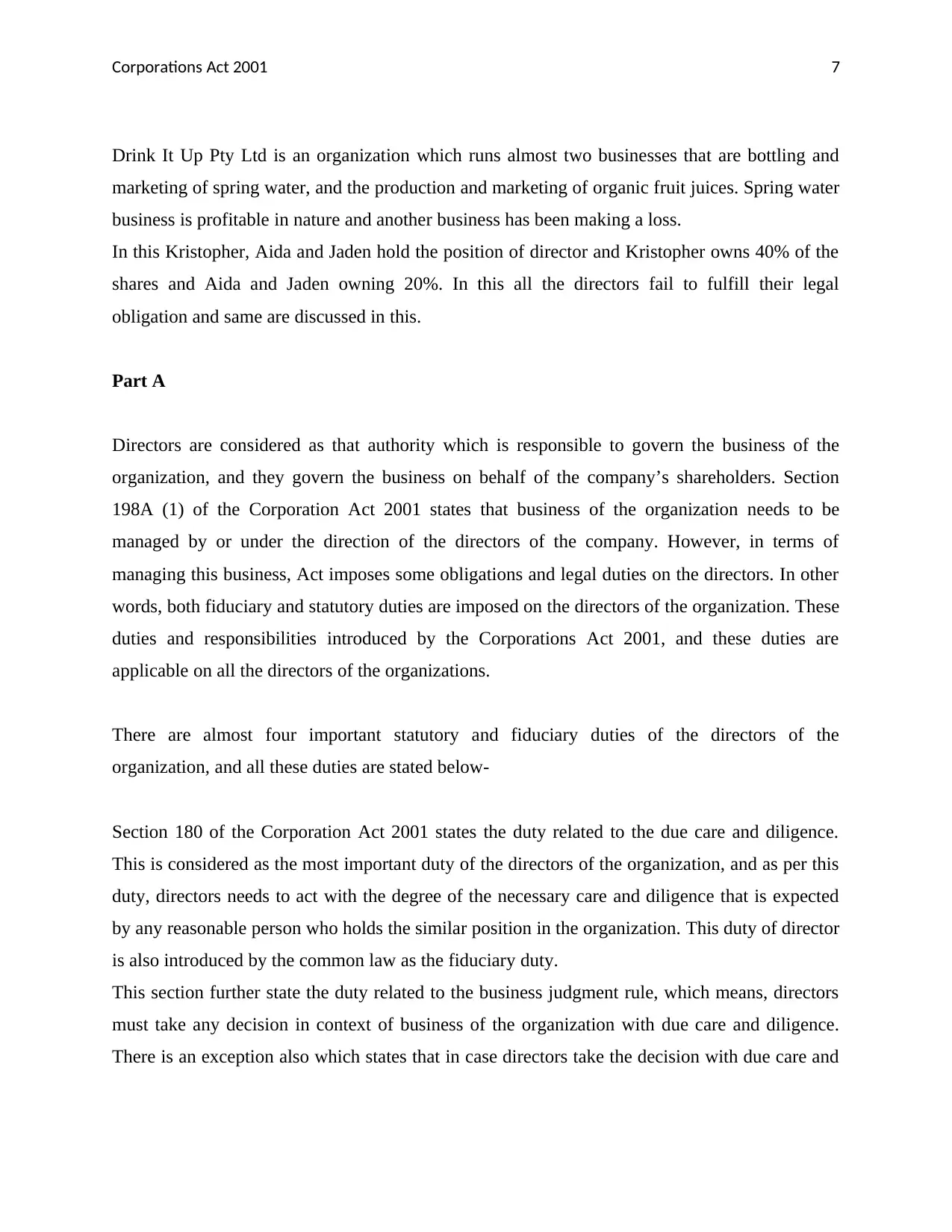
Corporations Act 2001 7
Drink It Up Pty Ltd is an organization which runs almost two businesses that are bottling and
marketing of spring water, and the production and marketing of organic fruit juices. Spring water
business is profitable in nature and another business has been making a loss.
In this Kristopher, Aida and Jaden hold the position of director and Kristopher owns 40% of the
shares and Aida and Jaden owning 20%. In this all the directors fail to fulfill their legal
obligation and same are discussed in this.
Part A
Directors are considered as that authority which is responsible to govern the business of the
organization, and they govern the business on behalf of the company’s shareholders. Section
198A (1) of the Corporation Act 2001 states that business of the organization needs to be
managed by or under the direction of the directors of the company. However, in terms of
managing this business, Act imposes some obligations and legal duties on the directors. In other
words, both fiduciary and statutory duties are imposed on the directors of the organization. These
duties and responsibilities introduced by the Corporations Act 2001, and these duties are
applicable on all the directors of the organizations.
There are almost four important statutory and fiduciary duties of the directors of the
organization, and all these duties are stated below-
Section 180 of the Corporation Act 2001 states the duty related to the due care and diligence.
This is considered as the most important duty of the directors of the organization, and as per this
duty, directors needs to act with the degree of the necessary care and diligence that is expected
by any reasonable person who holds the similar position in the organization. This duty of director
is also introduced by the common law as the fiduciary duty.
This section further state the duty related to the business judgment rule, which means, directors
must take any decision in context of business of the organization with due care and diligence.
There is an exception also which states that in case directors take the decision with due care and
Drink It Up Pty Ltd is an organization which runs almost two businesses that are bottling and
marketing of spring water, and the production and marketing of organic fruit juices. Spring water
business is profitable in nature and another business has been making a loss.
In this Kristopher, Aida and Jaden hold the position of director and Kristopher owns 40% of the
shares and Aida and Jaden owning 20%. In this all the directors fail to fulfill their legal
obligation and same are discussed in this.
Part A
Directors are considered as that authority which is responsible to govern the business of the
organization, and they govern the business on behalf of the company’s shareholders. Section
198A (1) of the Corporation Act 2001 states that business of the organization needs to be
managed by or under the direction of the directors of the company. However, in terms of
managing this business, Act imposes some obligations and legal duties on the directors. In other
words, both fiduciary and statutory duties are imposed on the directors of the organization. These
duties and responsibilities introduced by the Corporations Act 2001, and these duties are
applicable on all the directors of the organizations.
There are almost four important statutory and fiduciary duties of the directors of the
organization, and all these duties are stated below-
Section 180 of the Corporation Act 2001 states the duty related to the due care and diligence.
This is considered as the most important duty of the directors of the organization, and as per this
duty, directors needs to act with the degree of the necessary care and diligence that is expected
by any reasonable person who holds the similar position in the organization. This duty of director
is also introduced by the common law as the fiduciary duty.
This section further state the duty related to the business judgment rule, which means, directors
must take any decision in context of business of the organization with due care and diligence.
There is an exception also which states that in case directors take the decision with due care and
Paraphrase This Document
Need a fresh take? Get an instant paraphrase of this document with our AI Paraphraser
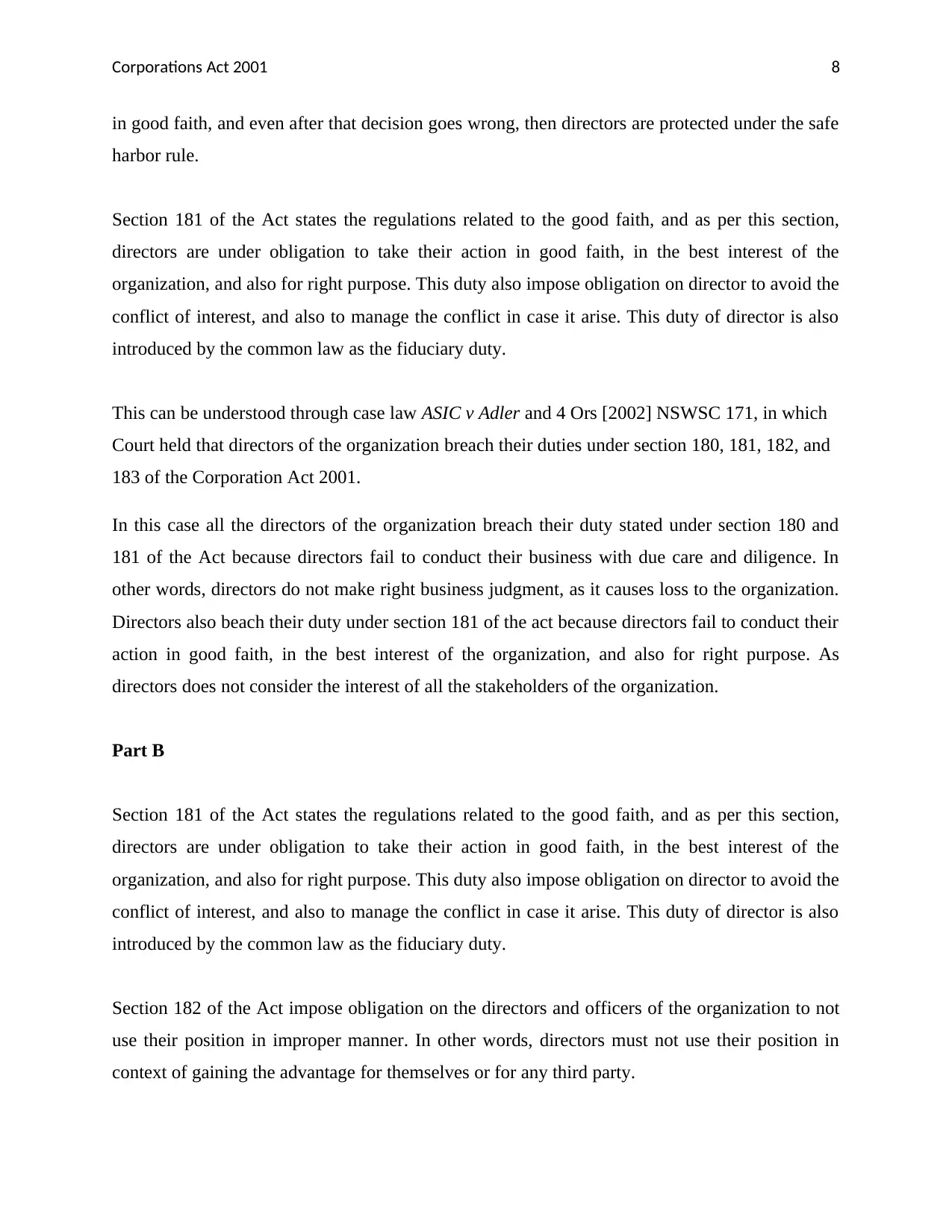
Corporations Act 2001 8
in good faith, and even after that decision goes wrong, then directors are protected under the safe
harbor rule.
Section 181 of the Act states the regulations related to the good faith, and as per this section,
directors are under obligation to take their action in good faith, in the best interest of the
organization, and also for right purpose. This duty also impose obligation on director to avoid the
conflict of interest, and also to manage the conflict in case it arise. This duty of director is also
introduced by the common law as the fiduciary duty.
This can be understood through case law ASIC v Adler and 4 Ors [2002] NSWSC 171, in which
Court held that directors of the organization breach their duties under section 180, 181, 182, and
183 of the Corporation Act 2001.
In this case all the directors of the organization breach their duty stated under section 180 and
181 of the Act because directors fail to conduct their business with due care and diligence. In
other words, directors do not make right business judgment, as it causes loss to the organization.
Directors also beach their duty under section 181 of the act because directors fail to conduct their
action in good faith, in the best interest of the organization, and also for right purpose. As
directors does not consider the interest of all the stakeholders of the organization.
Part B
Section 181 of the Act states the regulations related to the good faith, and as per this section,
directors are under obligation to take their action in good faith, in the best interest of the
organization, and also for right purpose. This duty also impose obligation on director to avoid the
conflict of interest, and also to manage the conflict in case it arise. This duty of director is also
introduced by the common law as the fiduciary duty.
Section 182 of the Act impose obligation on the directors and officers of the organization to not
use their position in improper manner. In other words, directors must not use their position in
context of gaining the advantage for themselves or for any third party.
in good faith, and even after that decision goes wrong, then directors are protected under the safe
harbor rule.
Section 181 of the Act states the regulations related to the good faith, and as per this section,
directors are under obligation to take their action in good faith, in the best interest of the
organization, and also for right purpose. This duty also impose obligation on director to avoid the
conflict of interest, and also to manage the conflict in case it arise. This duty of director is also
introduced by the common law as the fiduciary duty.
This can be understood through case law ASIC v Adler and 4 Ors [2002] NSWSC 171, in which
Court held that directors of the organization breach their duties under section 180, 181, 182, and
183 of the Corporation Act 2001.
In this case all the directors of the organization breach their duty stated under section 180 and
181 of the Act because directors fail to conduct their business with due care and diligence. In
other words, directors do not make right business judgment, as it causes loss to the organization.
Directors also beach their duty under section 181 of the act because directors fail to conduct their
action in good faith, in the best interest of the organization, and also for right purpose. As
directors does not consider the interest of all the stakeholders of the organization.
Part B
Section 181 of the Act states the regulations related to the good faith, and as per this section,
directors are under obligation to take their action in good faith, in the best interest of the
organization, and also for right purpose. This duty also impose obligation on director to avoid the
conflict of interest, and also to manage the conflict in case it arise. This duty of director is also
introduced by the common law as the fiduciary duty.
Section 182 of the Act impose obligation on the directors and officers of the organization to not
use their position in improper manner. In other words, directors must not use their position in
context of gaining the advantage for themselves or for any third party.
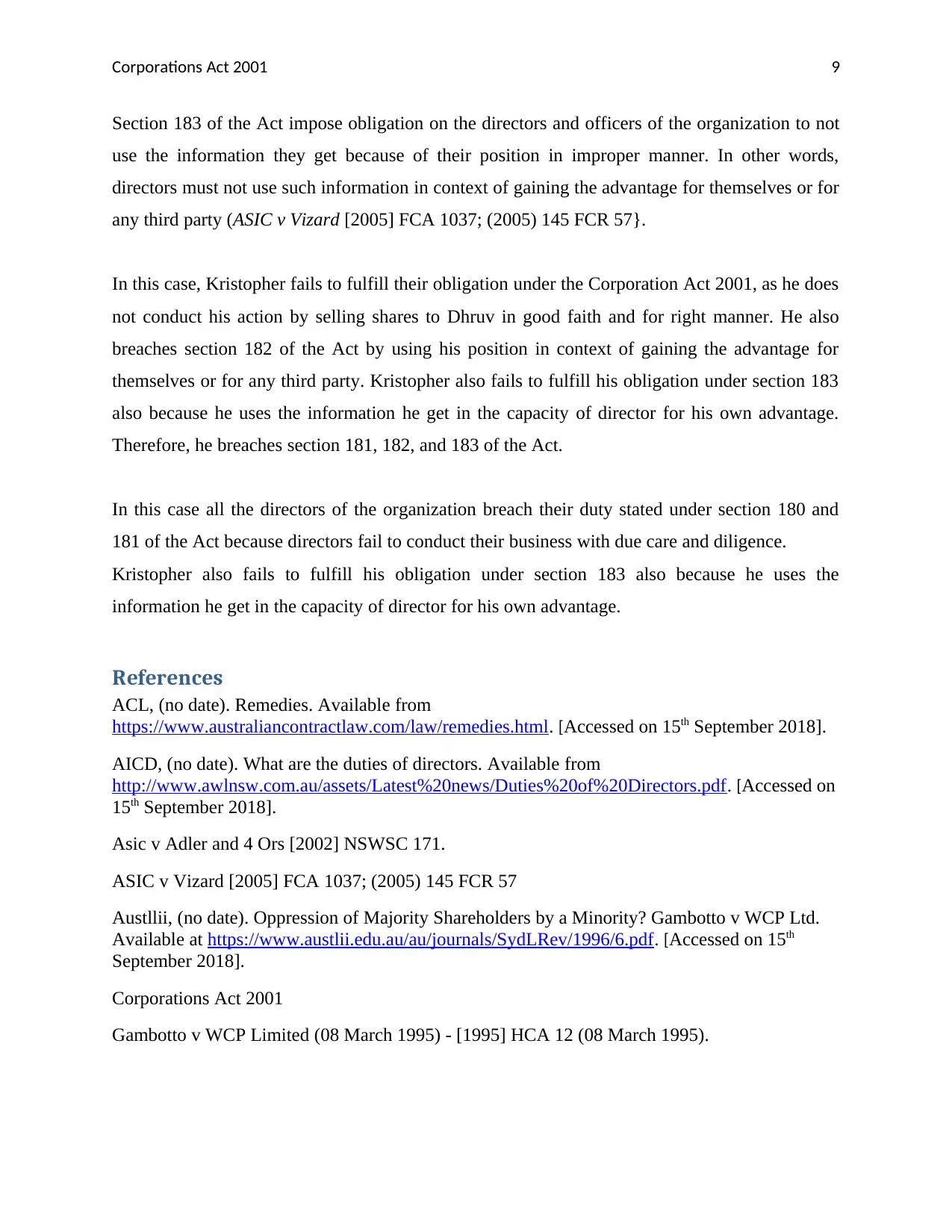
Corporations Act 2001 9
Section 183 of the Act impose obligation on the directors and officers of the organization to not
use the information they get because of their position in improper manner. In other words,
directors must not use such information in context of gaining the advantage for themselves or for
any third party (ASIC v Vizard [2005] FCA 1037; (2005) 145 FCR 57}.
In this case, Kristopher fails to fulfill their obligation under the Corporation Act 2001, as he does
not conduct his action by selling shares to Dhruv in good faith and for right manner. He also
breaches section 182 of the Act by using his position in context of gaining the advantage for
themselves or for any third party. Kristopher also fails to fulfill his obligation under section 183
also because he uses the information he get in the capacity of director for his own advantage.
Therefore, he breaches section 181, 182, and 183 of the Act.
In this case all the directors of the organization breach their duty stated under section 180 and
181 of the Act because directors fail to conduct their business with due care and diligence.
Kristopher also fails to fulfill his obligation under section 183 also because he uses the
information he get in the capacity of director for his own advantage.
References
ACL, (no date). Remedies. Available from
https://www.australiancontractlaw.com/law/remedies.html. [Accessed on 15th September 2018].
AICD, (no date). What are the duties of directors. Available from
http://www.awlnsw.com.au/assets/Latest%20news/Duties%20of%20Directors.pdf. [Accessed on
15th September 2018].
Asic v Adler and 4 Ors [2002] NSWSC 171.
ASIC v Vizard [2005] FCA 1037; (2005) 145 FCR 57
Austllii, (no date). Oppression of Majority Shareholders by a Minority? Gambotto v WCP Ltd.
Available at https://www.austlii.edu.au/au/journals/SydLRev/1996/6.pdf. [Accessed on 15th
September 2018].
Corporations Act 2001
Gambotto v WCP Limited (08 March 1995) - [1995] HCA 12 (08 March 1995).
Section 183 of the Act impose obligation on the directors and officers of the organization to not
use the information they get because of their position in improper manner. In other words,
directors must not use such information in context of gaining the advantage for themselves or for
any third party (ASIC v Vizard [2005] FCA 1037; (2005) 145 FCR 57}.
In this case, Kristopher fails to fulfill their obligation under the Corporation Act 2001, as he does
not conduct his action by selling shares to Dhruv in good faith and for right manner. He also
breaches section 182 of the Act by using his position in context of gaining the advantage for
themselves or for any third party. Kristopher also fails to fulfill his obligation under section 183
also because he uses the information he get in the capacity of director for his own advantage.
Therefore, he breaches section 181, 182, and 183 of the Act.
In this case all the directors of the organization breach their duty stated under section 180 and
181 of the Act because directors fail to conduct their business with due care and diligence.
Kristopher also fails to fulfill his obligation under section 183 also because he uses the
information he get in the capacity of director for his own advantage.
References
ACL, (no date). Remedies. Available from
https://www.australiancontractlaw.com/law/remedies.html. [Accessed on 15th September 2018].
AICD, (no date). What are the duties of directors. Available from
http://www.awlnsw.com.au/assets/Latest%20news/Duties%20of%20Directors.pdf. [Accessed on
15th September 2018].
Asic v Adler and 4 Ors [2002] NSWSC 171.
ASIC v Vizard [2005] FCA 1037; (2005) 145 FCR 57
Austllii, (no date). Oppression of Majority Shareholders by a Minority? Gambotto v WCP Ltd.
Available at https://www.austlii.edu.au/au/journals/SydLRev/1996/6.pdf. [Accessed on 15th
September 2018].
Corporations Act 2001
Gambotto v WCP Limited (08 March 1995) - [1995] HCA 12 (08 March 1995).
⊘ This is a preview!⊘
Do you want full access?
Subscribe today to unlock all pages.

Trusted by 1+ million students worldwide
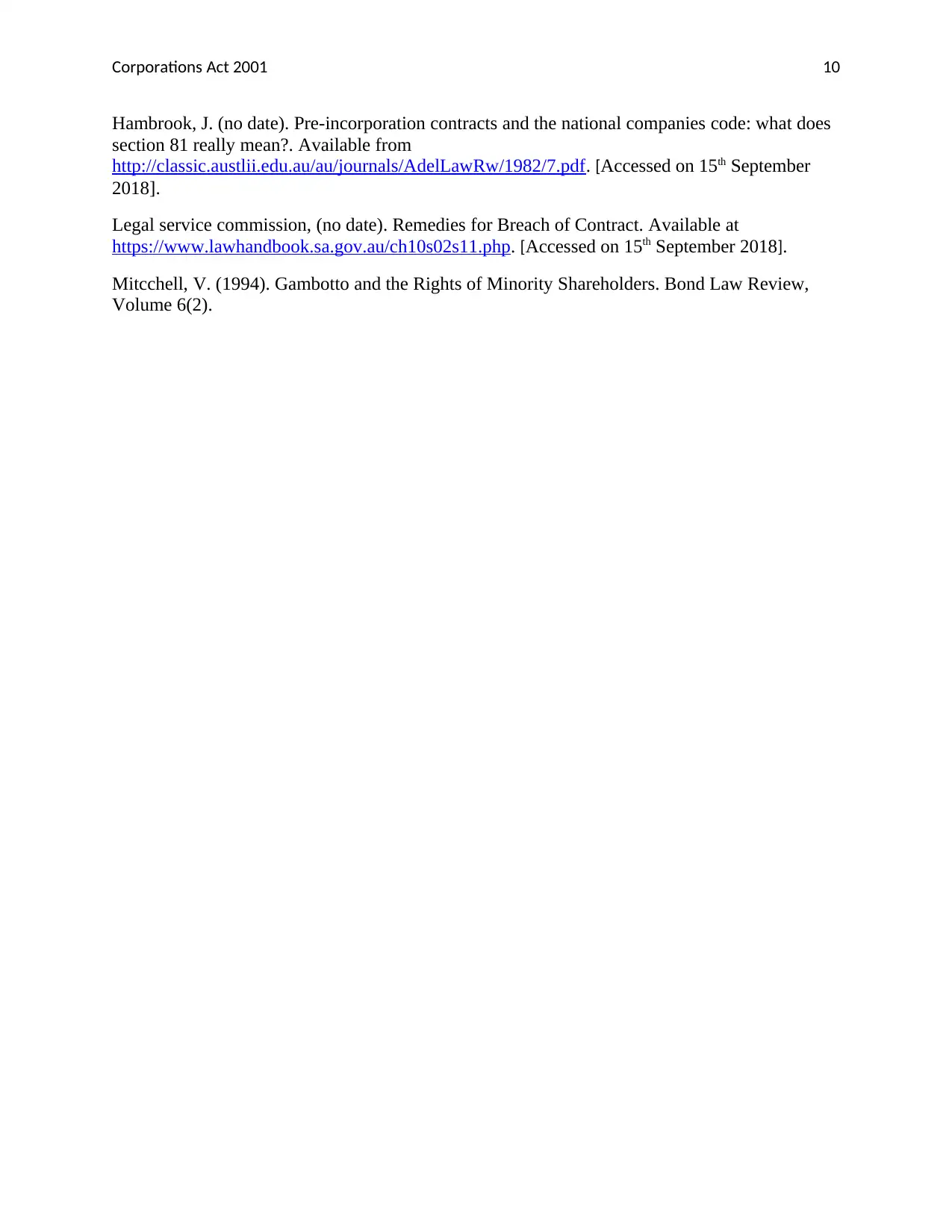
Corporations Act 2001 10
Hambrook, J. (no date). Pre-incorporation contracts and the national companies code: what does
section 81 really mean?. Available from
http://classic.austlii.edu.au/au/journals/AdelLawRw/1982/7.pdf. [Accessed on 15th September
2018].
Legal service commission, (no date). Remedies for Breach of Contract. Available at
https://www.lawhandbook.sa.gov.au/ch10s02s11.php. [Accessed on 15th September 2018].
Mitcchell, V. (1994). Gambotto and the Rights of Minority Shareholders. Bond Law Review,
Volume 6(2).
Hambrook, J. (no date). Pre-incorporation contracts and the national companies code: what does
section 81 really mean?. Available from
http://classic.austlii.edu.au/au/journals/AdelLawRw/1982/7.pdf. [Accessed on 15th September
2018].
Legal service commission, (no date). Remedies for Breach of Contract. Available at
https://www.lawhandbook.sa.gov.au/ch10s02s11.php. [Accessed on 15th September 2018].
Mitcchell, V. (1994). Gambotto and the Rights of Minority Shareholders. Bond Law Review,
Volume 6(2).
1 out of 10
Related Documents
Your All-in-One AI-Powered Toolkit for Academic Success.
+13062052269
info@desklib.com
Available 24*7 on WhatsApp / Email
![[object Object]](/_next/static/media/star-bottom.7253800d.svg)
Unlock your academic potential
Copyright © 2020–2026 A2Z Services. All Rights Reserved. Developed and managed by ZUCOL.




